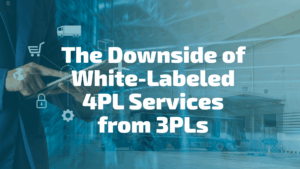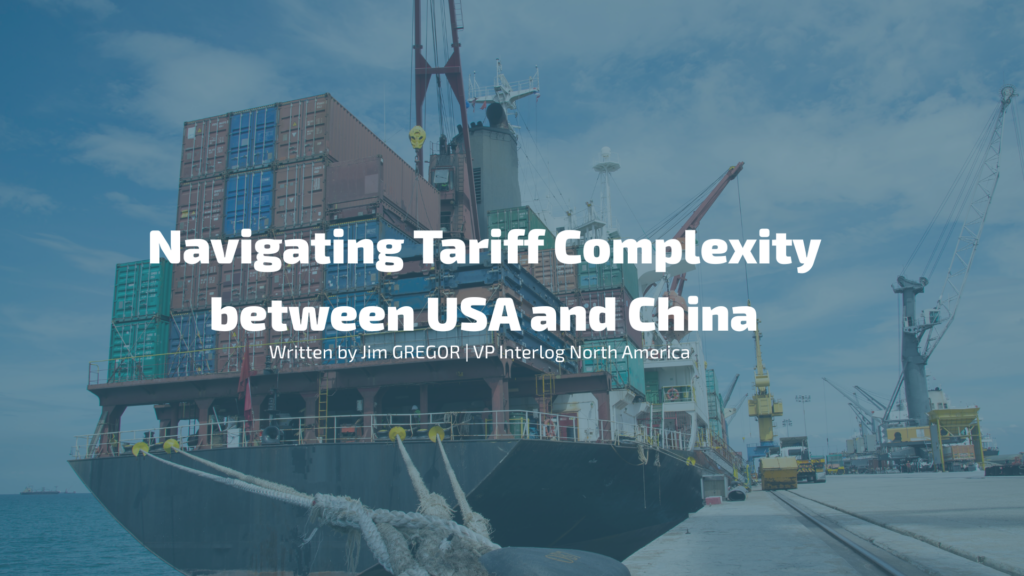As global supply chains continue to evolve, companies are faced with an increasing amount of complexity. From navigating new regulations and tariffs to coordinating carriers across multiple regions, logistics has become a challenging puzzle. Many organizations turn to fourth-party logistics (4PL) providers to help manage this complexity, streamline processes, and optimize costs. A 4PL is supposed to be the central point of coordination, managing multiple logistics providers and bringing clarity to what is often a confusing landscape.
In recent years, a trend has emerged where large third-party logistics companies (3PLs) have begun offering white-labeled 4PL services. In this setup, the 3PL operates behind the scenes, providing services under the client’s brand name. To the outside world, it appears that the client is fully managing their supply chain, while in reality, the 3PL is calling the shots. At first glance, this arrangement sounds appealing. It promises simplicity, a seamless experience, and the appearance of having complete control. However, the truth is more complicated.
While white labeling might seem like a convenient shortcut, it comes with some significant disadvantages. In many cases, working with an independent 4PL provider delivers far greater transparency, accountability, and long-term value. Here are some of the key reasons why relying on a white-labeled 4PL solution can actually create more problems than it solves.
The Conflict of Interest Problem
The most fundamental issue with white-labeled 4PL services is the built-in conflict of interest. A 3PL’s primary business revolves around moving goods using its own assets, technology platforms, and preferred partner network. These companies make money by selling their transportation services, warehousing space, and related offerings. When a 3PL also serves as a 4PL, it is expected to act as a neutral, strategic advisor. However, its financial incentives remain tied to its core business.
This creates a natural tension. Imagine asking a car dealership for unbiased advice on whether you really need a new vehicle. You might get some good suggestions, but odds are they’ll recommend a solution that involves you driving off the lot with one of their cars. In the same way, a 3PL posing as a 4PL may appear to present a wide range of options, but behind the curtain, it can be prioritizing its own services or its closest partners.
The client is left believing they are receiving an objective, data-driven strategy when in fact decisions may be influenced by what benefits the 3PL most. This hidden bias can lead to higher costs, missed opportunities, and logistics processes that serve the provider’s interests rather than the client’s.
An independent 4PL avoids this problem entirely. Because we do not own trucks, warehouses, or transportation networks, we have no reason to push a particular carrier or warehouse. Every recommendation is based on what delivers the best results for the client, whether that means lower costs, better performance, or faster delivery times. This independence allows companies to truly optimize their logistics without worrying about hidden agendas.
Accountability Gets Murky
Another major drawback of white-labeled services is the lack of clear accountability. When a 3PL operates invisibly under the client’s brand, it can become extremely difficult to identify where problems originate.
Picture this scenario: a shipment is delayed, a customer is upset, and your internal team needs answers fast. Who is actually responsible for resolving the issue? Is it your company, since the service is being presented as yours? Is it the white-labeled 3PL, who is actually running the show? Or is it a downstream carrier that dropped the ball? By the time you untangle the chain of responsibility, valuable time has been lost and frustration has escalated.
This confusion is not just inconvenient, it can have real business consequences. Delayed responses erode customer trust, and slow problem resolution can lead to additional costs. It also creates internal strain, as employees are forced to spend time chasing answers instead of focusing on strategic improvements.
Independent 4PL providers eliminate this problem by serving as a single point of accountability. This clarity makes it easier to address issues quickly and gives the client peace of mind knowing they have a true partner standing behind them.
Limited Access to Innovation
Large 3PLs are highly invested in their own systems, platforms, and technologies. When they offer white-labeled services, they naturally gravitate toward solutions that align with their existing network. This can severely limit the client’s access to new ideas or cutting-edge tools.
For instance, a 3PL might have its own transportation management system (TMS) or freight audit process that it insists on using. Even if there is a better, more advanced tool available on the market, the client may never see it. In some cases, the 3PL may not even mention that other options exist.
This kind of limitation can stifle innovation and prevent companies from exploring new ways to gain a competitive advantage. Over time, the client’s logistics strategy may start to feel outdated and inflexible, while competitors who work with independent 4PLs continue to evolve.
How white labeling limits innovation:
- Forced reliance on outdated or proprietary systems.
- Fewer opportunities to test emerging technologies or new carriers.
- Limited flexibility to adapt quickly to market changes.
- Reduced visibility into industry trends and best practices.
Independent 4PLs bring a much broader perspective. Because they are not tied to a single network or system, they can evaluate and integrate best-in-class solutions from across the industry. Whether it is implementing a new data analytics platform, testing a different carrier model, or adopting emerging technology, an independent 4PL can move quickly and creatively to deliver what the client truly needs. Think of it like being free to shop at multiple stores, rather than being locked into a single brand that may or may not have what you want.
The Illusion of Control
At first, white labeling might feel empowering. After all, the service operates under the client’s brand name, giving the impression that the company is fully managing its own supply chain. But this is often just an illusion.
When a 3PL controls operations behind the scenes, the client loses visibility into how decisions are made and what data is being collected. Key insights about performance, costs, and customer trends may remain hidden within the 3PL’s systems. Over time, the client becomes dependent on the provider, unable to fully understand or replicate the processes on their own.
This dependency can be dangerous, especially if the relationship ever needs to change. Transitioning away from a white-labeled service can be incredibly difficult because the client may not have access to the systems, data, or workflows that have been running under their brand. It’s a bit like renting a house for years, only to find out that you never really knew how the plumbing worked until you owned a place yourself.
By contrast, an independent 4PL works transparently, giving clients full access to their own data and a clear view of how decisions are made. This transparency empowers the client to build its own capabilities over time, creating true control rather than just the appearance of it.
The Branding Trap
There is also a subtle branding risk to consider. When a 3PL operates under your name, your company becomes closely tied to the quality of its services. If the 3PL underperforms, customers will not blame the 3PL because they never knew it was involved in the first place. They will blame you.
Imagine an important client experiencing repeated delivery problems. From their perspective, your company is directly responsible. Meanwhile, you may have very little control over the actual operations causing the issue. This disconnect can harm your reputation and strain relationships with key accounts.
Working with an independent 4PL protects against this scenario. Because the 4PL is openly identified as a partner, it is clear to everyone involved who is responsible for which aspects of the supply chain. This clarity helps protect your brand while still delivering high-quality service.
Why Independent 4PLs Stand Out
Independent 4PLs are designed to be objective, flexible, and client-focused. Their entire purpose is to serve as a trusted advisor and strategic partner. By staying free of asset ownership and network obligations, they can focus solely on optimizing performance and driving long-term value for the client.
What sets independent 4PLs apart:
- Unbiased recommendations based on performance and value, not internal interests.
- Freedom to work with any carrier, technology, or partner that fits your needs.
- Transparent processes and open access to data.
- Single point of accountability for all logistics functions.
- Flexible, innovative strategies that evolve with your business.
An independent 4PL understands that logistics is not just about moving freight from point A to point B. It is about building strong relationships, fostering innovation, and creating resilient systems that can withstand disruption. Sometimes that even means injecting a bit of humor into challenging conversations. After all, if we can’t laugh about a delayed shipment once in a while, we might just cry instead.
The Bottom Line
White-labeled 4PL services from large 3PLs may sound appealing at first. They promise simplicity, brand consistency, and an easy path to outsourcing logistics management. However, beneath the surface, they introduce serious risks: conflicts of interest, murky accountability, limited innovation, loss of control, and potential damage to your brand.
Key takeaways:
- White labeling hides conflicts of interest that can drive up costs.
- Accountability becomes unclear, slowing problem resolution.
- Innovation is restricted by reliance on a single provider’s systems.
- Your brand’s reputation is tied to a service you do not fully control.
- Independence ensures transparency and protects your long-term strategy.
Choosing an independent 4PL provides a different path. It offers transparency, flexibility, and a true partnership built on trust. With an independent provider, you gain not only a logistics expert but also a dedicated ally focused entirely on your success.
In logistics, there are no shortcuts to building a supply chain that is both efficient and resilient. While white labeling might seem like a clever workaround, the long-term costs often outweigh the short-term convenience. Working with an independent 4PL ensures that your strategy remains your own, your data stays in your hands, and your future remains firmly under your control.
And if you ever need someone to help sort out a freight bill, an independent 4PL will be there to untangle the mess, no white labels required.
Jim Gregor
VP North America
jgregor@interlogservices.com



